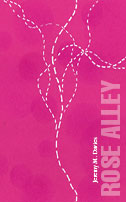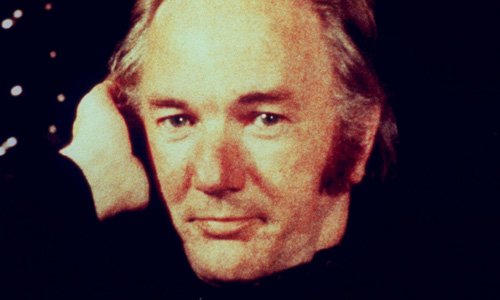Jeremy M. Davies’s ‘Rose Alley’
 Just out (today!) from the wonderful Counterpath Press is Jeremy M. Davies’s debut novel, ‘Rose Alley,’ a book ostensibly about an obscure blue film made during the 1968 Paris riots. The book consists of a series of chapters each based on one of the film’s crew and cast, chaining the mostly by turns gristly and sex/violence addled lives and whereabouts in their intersection with the film’s strange creation and resulting aura.
Just out (today!) from the wonderful Counterpath Press is Jeremy M. Davies’s debut novel, ‘Rose Alley,’ a book ostensibly about an obscure blue film made during the 1968 Paris riots. The book consists of a series of chapters each based on one of the film’s crew and cast, chaining the mostly by turns gristly and sex/violence addled lives and whereabouts in their intersection with the film’s strange creation and resulting aura.
Davies’s prose sings from paragraph to paragraph in that way of Pynchon and Hannah, in that each could stand alone in its music, and each contains multitudes, packed into syllables clearly fought for and refined for their finest parts.
For a more thorough review of the book, please check out my post in this month’s edition of Bookslut, including my claim: “Here is a debut novel full not only of sex and violence, alternate histories, layerings of will, but also in sentences designed to entertain as much as dazzle, making Jeremy M. Davies a great new brain trust for the page.”
Stephen Elliott reacts to BEA

Stephen Elliott just got back from BEA (BookExpo America, the “largest publishing event in North America”), and he wrote an essay about it.
I couldn’t agree with this more:
But here’s the thing, I don’t care about those books. I don’t care about the publishing industry that’s concerned with cookbooks and celebrity memoirs. And I don’t believe the people that say they’re publishing celebrity memoirs so they can publish great literature…
READ MORE >
Power Quote: Thomas Bernhard

The matured idea is enough in itself to destroy most people.
– Correction, p. 203
Influences: Me

Years later here I am, still writing because of her influence.
I wrote this story for her and put it on my blog.
(That whole thing is a link.)
06.07.2009 THE SUSAN G. KOMEN RACE FOR THE CURE.
(That’s another one.)
June 1st, 2009 / 12:28 pm
Sentence by Sentence & Story by Story (2): ‘A Pursuit’

The second story in Brian Evenson’s ‘Fugue State,’ is ‘A Pursuit,’ which I have written up in full here.
My sentence to keep from this story (I can’t say favorite anymore, as there are too many, but choices hereon will be considered strong and representative at once):
Would it help if I were to swear to you, by the deceased individual of your choice, that I had nothing to do with my first ex-wife’s demise, assuming she is in fact dead?
This sentence, itself a whole graph in the text, is wonderful again not only for its Evensonian use of odd familial tags such ‘first ex-wife’ (I always go back to his ‘The Ex Father,’ and those weird overtones of relationship bounds), but for how it manages to begin to drag the reader (the ‘you’) as an entity into the text, another relationship that will continue to be put to use in the extremely odd and Bernhard-ian summoning that goes on in this text.
As I discuss in the full story review, Evenson is a master of blurring the lines of his occurrences, here as delivered on behalf of the narrator, in such a way that it is not only hard to condemn or not condemn the actions of the central figure, it also blurs the body of that narrator with the body of the reader, in such a way that the reading itself becomes an experience. You are caught in the narrator’s ongoing waddle into his own mind. You follow him along terrain that will not hold, etc.
The question is a question that eats the space out from between the reader and the narrator itself, which, how much more could you ask from a single line?
